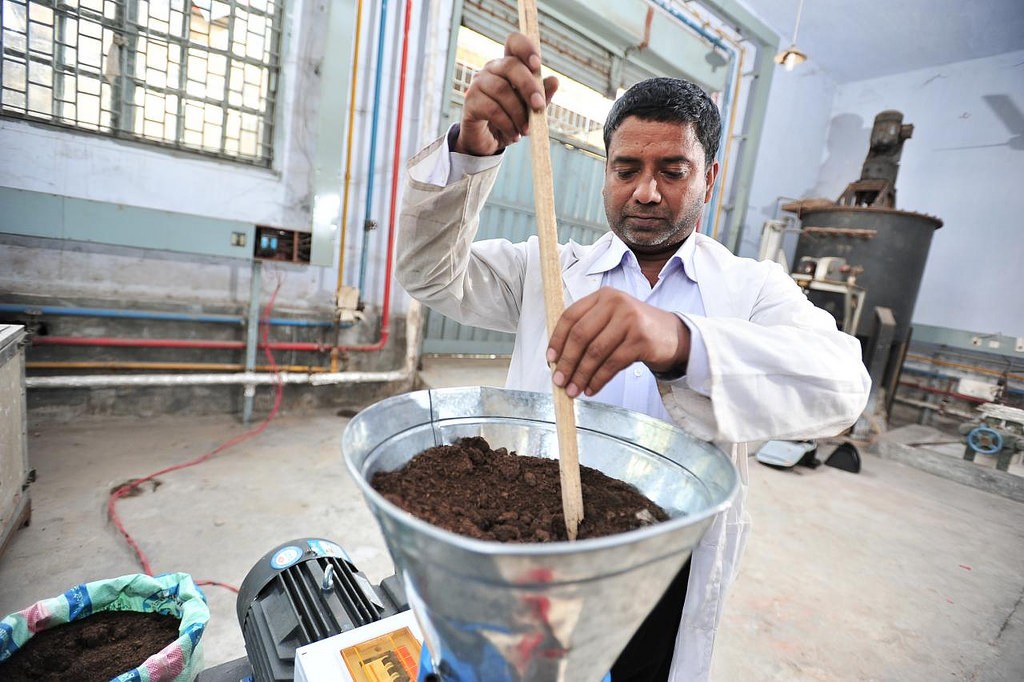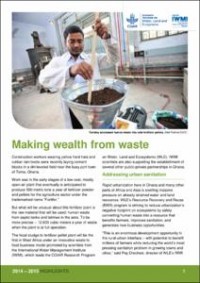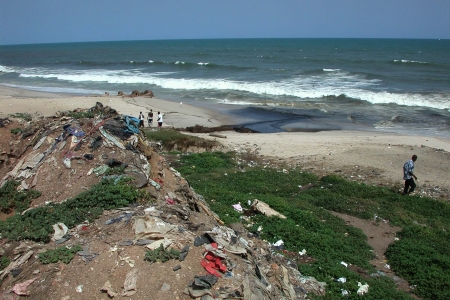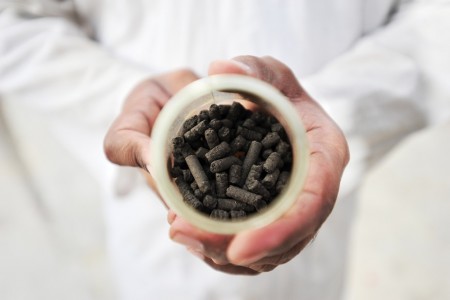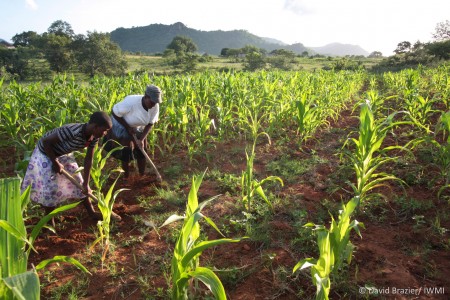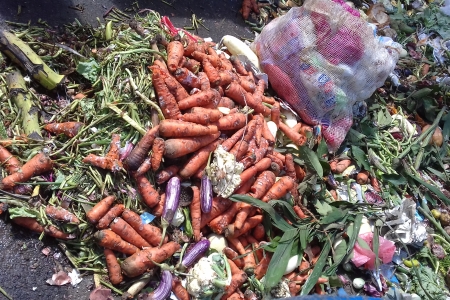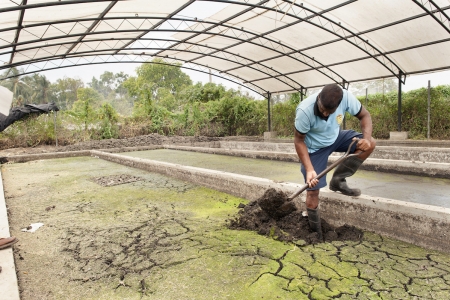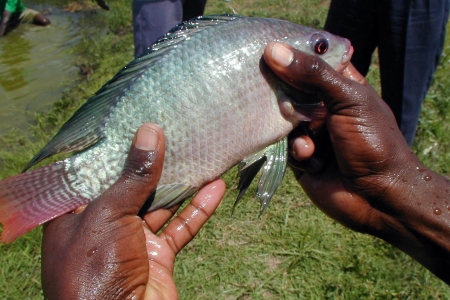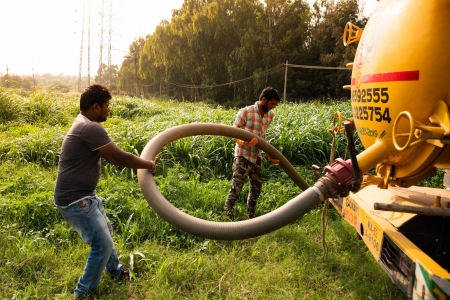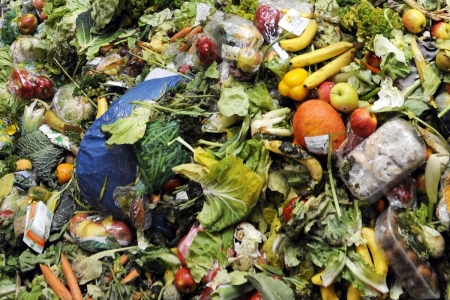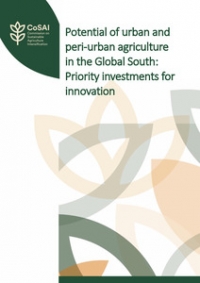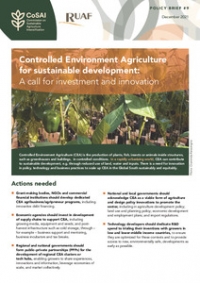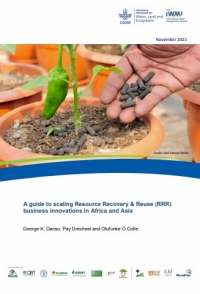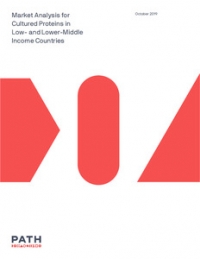In Ghana, fertilizer pellets from fecal sludge are becoming a reality
Construction workers wearing yellow hard hats and rubber rain boots were recently laying cement blocks in a dirt-leveled field near the busy port town of Tema, Ghana.
Work was in the early stages of a low-cost, mostly open-air plant that eventually is anticipated to produce 500 metric tons a year of fertilizer powder and pellets for the agriculture sector under the trademarked name “Fortifer.”
But what will be unusual about this fertilizer plant is the raw material that will be used: human waste from septic tanks and latrines in the area. To be more precise -- 12,600 cubic meters a year of waste when the plant is at full operation.
The fecal sludge to fertilizer pellet plant will be the first in West Africa under an innovative waste to food business model promoted by scientists from the International Water Management Institute (IWMI), which leads the CGIAR Research Program on Water, Land and Ecosystems (WLE). IWMI scientists are also supporting the establishment of several other public-private partnerships in Ghana.
Addressing Urban Sanitation
Rapid urbanization here in Ghana and many other parts of Africa and Asia is exerting massive pressure on already strained water and land resources. WLE’s Resource Recovery and Reuse (RRR) program is striving to reduce urbanization’s negative footprint on ecosystems by safely converting human waste into a resource that benefits farmers, improves sanitation, and generates new business opportunities.
“This is an enormous development opportunity in the rural-urban interface – with potential to benefit millions of farmers while reducing the world’s most pressing sanitation problem in growing towns and cities,” said Pay Drechsel, director of WLE’s RRR program and IWMI’s theme leader on water quality, health and environment.
Humans generate millions of tons of solid and liquid waste every day. In the developing world, many cities don’t have adequate treatment facilities for the fecal matter. Often the waste collects in sewers, household septic tanks or pit latrines – basic toilets that collect feces in a hole in the ground. Where treatment is lacking, waste ends up in water bodies or land. This leads to pollution of the water used on farms downstream, bringing urban fecal matter back up the food chain and to the urban household table. The result of this cycle is severe environmental pollution and public health problems.
In Ghana as in many parts of sub-Saharan Africa, more than 90 percent of human waste is discharged into the environment, contaminating coastal areas, urban land, waterways, and food supplies. In the capital city of Accra, the large majority of the feces ends up in the ocean without any proper treatment, not far from beach resorts.
“Fecal sludge management remains a major concern in fast growing African cities,” said IWMI environmental scientist Josiane Nikiema. “A solution such as the one we are currently implementing can offer a safe and sustainable alternative to practices that have been shown to damage human health and the environment.”
(Globally, tens of millions of households rely on wastewater irrigation to grow the crops that their livelihoods depend upon. Irrigated urban croplands aren’t just playing an increasing role in sub-Saharan Africa, but also in densely populated and/or water scarce regions such as South and East Asia and North Africa, according to a groundbreaking analysis of the size of urban and peri-urban farming last year by IWMI, Stanford University and the University of California-Berkeley.)
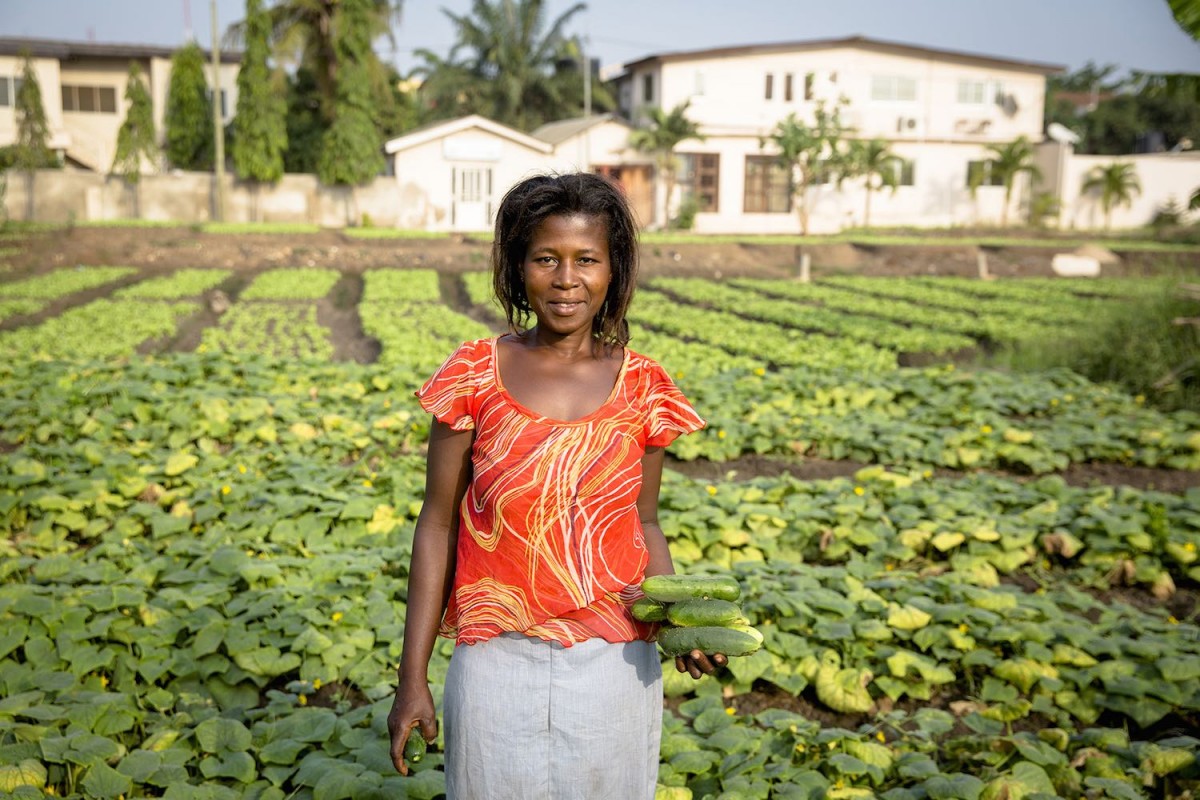
From waste to food: Fortifer
For 15 years now, IWMI and its partners have studied technological options for recycling fecal sludge to improve sanitation and create a “circular economy”. The research has resulted in the production of various forms of pathogen-free organic fertilizers, including Fortifer.
Laboratory analysis and pilot projects in Ghana showed that Fortifer is a safe product and can improve agricultural yields by 20 percent to 50 percent compared with the use of inorganic fertilizers, while also maintaining soil health. Market research revealed that there would be a large demand for the product among farmers in West Africa. With that knowledge, IWMI initiated the WaFo (From Waste to Food) project in Ghana to commercialize Fortifer through a public private partnership model.
The WaFo project is a partnership between Tema Metropolitan Assembly and Jekora Ventures Ltd., a Ghanaian-owned waste management company. The project also benefits from the support of the Training Research and Networking for Development (TREND), a non-governmental organization, which is leading the process of Fortifer certification with the Ministry of Food and Agriculture (MoFA) in Ghana. The Ghana Environmental Protection Agency granted a permit for the plant to be constructed near Tema, which is about 20 km up the coast from Accra.
Technical Options for Safe Resource Recovery from Fecal Sludge (PDF)
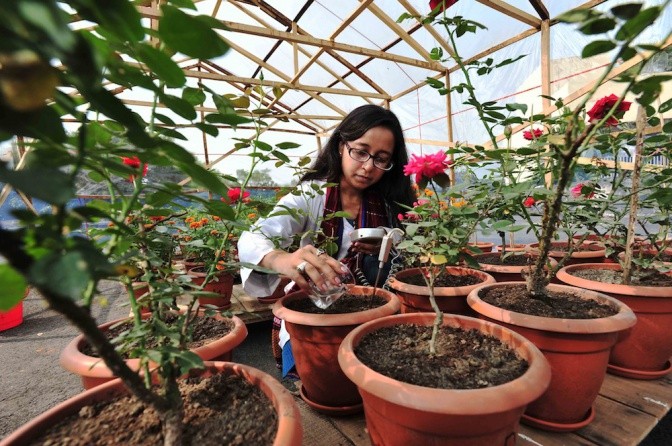
Resource Recovery and Reuse (RRR) drawing interest not just in Ghana, but globally
WLE’s Resource Recovery and Reuse (RRR) research theme serves three main roles:
- Advising banks, donors and the private/public sector on safe waste reuse and recovery investment options,
- Advising government authorities on policy revision, strategies and RRR guidance notes and
- Enhancing the capacities of business schools through the development of online RRR curricula.
In 2014, RRR conducted waste reuse feasibility studies in 11 cities in seven countries, accompanied by stakeholder consultations, training on business modeling, and “green” investment climate studies. One of the main outputs will be a catalog of RRR business cases and models that will be published under open access. The business models were also analyzed for potential environmental and health risks and gender-inclusiveness.
After examining an IWMI project on fecal sludge management in Bangladesh, the World Bank’s Water and Sanitation Program (WSP) in 2014 asked IWMI to jointly develop policy advisory notes on wastewater reuse and septage management for the central government of India. The World Bank also asked IWMI to help develop fecal-management strategies for India’s Madhya Pradesh state, a project which might be expanded this year to Tamil Nadu state.
“Reuse helps to not only close the service delivery chain, but also improves the sustainability of the project,” said Joseph Ravikumar, a senior institutional development specialist with the World Bank’s WSP. “What I saw of IWMI’s work in Bangladesh further strengthened my conviction that it is important to take market opportunities seriously.”
There were a number of other prominent examples of the interest in RRR’s work globally in 2014:
- The World Bank's Central Urban Advisory Unit asked WLE for an assessment of its experiences with composting in Ghana, Bangladesh, India and Sri Lanka. The assessments will be used to improve the World Bank’s guidelines for partner countries.
- In Sri Lanka, IWMI signed two national-level memorandums of understanding to help the island-nation improve its septage management policy and develop and strengthen human waste composting and co-composting initiatives. IWMI has started a project in northwestern Sri Lanka to demonstrate techniques for safe composting and turning human waste into a pellet fertilizer. IWMI was also asked by a government ministry to transform its experience into a university curriculum.
- The World Health Organization (WHO) and the U.N. Environment Program invited WLE/RRR to contribute to the Sustainable Development Goal target process, and to help identify indicators that will support safe wastewater management and reuse. RRR also assisted WHO in developing national fecal flow assessments and the first WHO Sanitation Safety Plan manual. The manual is designed to complement the RRR business models on wastewater and fecal sludge with risk mitigation measures and protocols.
- WLE and the U.N. University in Canada published a new book on the economics and business dimensions of wastewater reuse. Among other issues, the book focuses on cultural issues affecting wastewater reuse, including gender-related differences.
Collaboration, local tailoring will be key to replicating Fortifer model
Near Tema, Ghana, masons have been busy building the five open-air sludge drying beds, and the compost platform, which will be roofed with a short wall. The sludge will be poured onto drying beds to be dried, then collected and co-composted. Co-composting, which will sanitize the material, is the controlled degradation of organic material, using more than one feedstock – in this case fecal sludge will be combined with other organic food waste or sawdust to optimize the carbon and nitrogen content. As part of the co-composting process, the feedstock will be turned manually on a regular basis. The liquid that leaches from the drying beds will flow into a treatment area for bio-remediation, consisting of layers of gravel, sand and local grass such as lemongrass. If so desired, the nutrient value of the co-compost can be enriched with inorganic fertilizer. A particular innovation is that a set of machines then converts the compost to fertilizer pellets.
RRR has received a positive reception for its public-private partnership efforts and for the Fortifer pellets, which are less bulky and thus easier to handle and transport compared to conventional fertilizer. The ultimate goal is to expand WAFO nationally and beyond, proving that the technology is safe and efficient, and that the business can be replicated wherever farmers are in need of a high quality organic fertilizer. In Ghana, private sector partner Jekora Ventures and IWMI have been working together on a marketing plan for potential buyers. The Fortifer concept, of recycling fecal sludge to benefit farmers, is in line with the government of Ghana’s national sanitation policy and is already being replicated in Sri Lanka.
Another project to repurpose waste in Ghana, which was launched recently, is CapVal, or ‘Creating and Capturing Value: Supporting Enterprises for Urban Liquid and Solid Wastes Recycling for Food, Energy and Clean Environment’). Under the CapVal project, three business models focusing on three types of waste resources (solid waste, fecal sludge and sewage) will be tested through similar public private partnerships. The resulting products, fuel briquettes, co-compost and African catfish will be produced and marketed in Ghana.
“I hope that the success of the ‘Fortifer solution’ will bring a new thinking which puts emphasis on better resource management while contributing to higher agricultural productivity in developing countries,” Nikiema said.
She said collaboration will be essential to scaling out the concept and achieving meaningful impacts across the developing world. In each country, for example, there will be a need to listen to stakeholder concerns to solve the sanitation crisis occurring in their cities. Since the waste industry has limited experience with farming and marketing to farmers, waste to food enterprises will need to engage with the fertilizer industry. Ideally, Nikiema said, private companies, with their technical and marketing know-how, will be supported by government authorities, which supply the waste and have the political and policy commitment to meet the needs of farmers and other beneficiaries.
WLE will be conducting rigorous evaluation of the RRR projects, examining the economic, environmental, and health benefits.
“The end game is a transformative solution to the problem of waste and wastewater,” said Drechsel, “a solution that improves health, creates new opportunities for a circular economy, and improves food security.”
